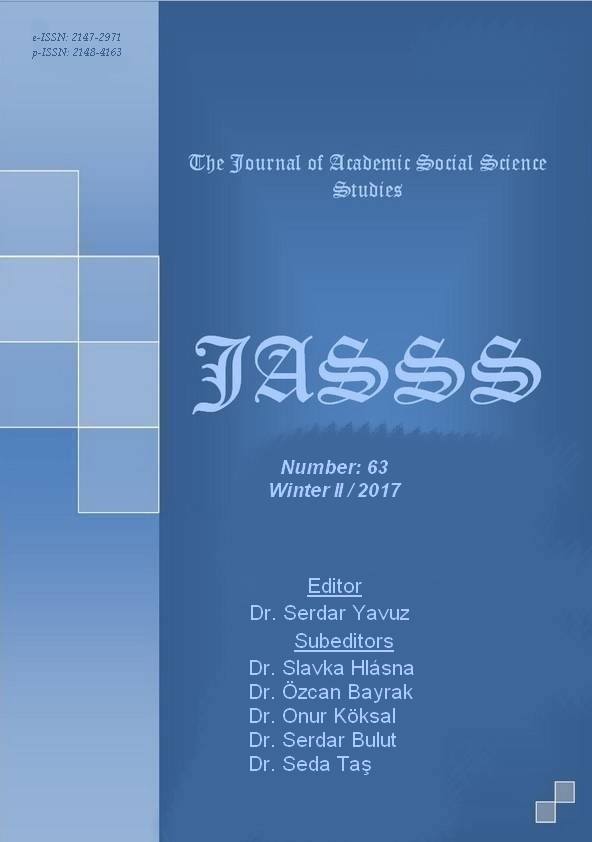Author :
Abstract
İbn Haldûn ünlü bir tarihçi, sosyolog, filozof ve sosyolojinin kurucusudur. Bu çalışma İbn Haldûn’un görüşleri bağlamında siyasî otorite ve meşruiyet ilişkisini konu edinmektedir. Bu bağlamda siyasî otorite kavramıyla yakından ilgili olan umran, asabiye, mülk, hilafet vb. kavramlar incelenmektedir. Siyaset bir yönüyle ‘en iyi’nin araştırılmasıdır. Olan ile olması gereken arasındaki karşıtlıklar bir açıdan üzerinde siyaset felsefesinin inşa edildiği etik bir paradigmayı belirlemektedir. Bu açıdan siyasetin meşruiyet arayışı etik bir temellendirmeyi, siyaset etik ilişkisini de öncelemektedir. Bu olgu, siyasal iktidar ve siyasetin meşruiyeti problemi devletin dinamik bir süreç içerisinde bulunduğu her aşamada dinamik bir sürekliliği ve sorunsalı kendi içerisinde barındırmaktadır. Meşruiyet, bireyin ve yöneticilerin otoritenin haklılığına duydukları inançtır. Siyasetin meşruiyeti farklı süreçler içerisinde, yaşanan değişimler karşısında değişmeyen ölçütlerin, meşruiyet zemininin neliğine yönelik bir arayışın ifadesidir. Meşruiyet, siyasi itaati alışkanlıklara dayalı bir rutin olmaktan çıkarıp, normatif bir gerekçeye dayandıran ilkenin adıdır. İbn Haldûn, siyasi otoriteyi üç kısımda inceler ve meşruiyetlerini tartışır. Bunlardan birincisi temelinde üstünlük kurma ve zor kullanma içeren “tabii mülk”tür. İkincisini ise dünyevî menfaatlere ulaşma, zararları ise uzaklaştırma konularında toplumun aklî düşüncenin gereğine göre yönetilmesini içeren “siyasi mülk” oluşturmaktadır. Sonuncusu ise dünya ve âhiret faydasına yönelik devletin dînî düşüncenin gereğine göre idare edilmesi olan “hilâfet”tir. İbn Haldûn, İslâm filozoflarının siyasi otorite görüşlerini eleştiri konusu yapmaktadır.
Keywords
Abstract
Ibn Khaldun was a famous historian, sociologist, philosopher and the founder of sociology. This study examines the relationship between political authority and legitimacy in the context of Ibn Khaldun's views. In this context, such concepts as prosperity (umran), collective conscience (asabiye), possession (mülk), caliphate (hilafet), which are closely related to the concept of political authority, are examined. Politics is a search for 'the best' in a way. It defines an ethical paradigm in which the philosophy of politics is built on the contradictions between ex post and de lege ferenda (between what is and what should be). In this respect, the pursuit of legitimacy in politics predicates an ethical grounding and also the relationship between politics and ethics. This phenomenon, the questions of the legitimacy of politics and political power, has a dynamic continuity and problematic in itself at every stage of the government's dynamic process. Legitimacy is the belief that the individual and the managers are justified by the authority. The concept of legitimacy of politics is the expression of a search for steady criteria against changes and the merits of the legitimacy ground within different processes. Legitimacy is the name of the principle that is based on political obedience away from habits and relies on a normative ground. Ibn Khaldun examines the political authority in three parts and discusses their legitimacy. The first of these is the "natural possession" that contains overtowering and using force on the basis. The second is "political possession" that includes to manage the society as necessitated by the mind in the fields of reaching worldly interests and removal of losses. The last one is the "caliphate" which means to conduct the government as a matter of religious thought for the benefit of the world and the hereafter. Ibn Khaldun criticizes the views of Islamic philosophers about political authority.





